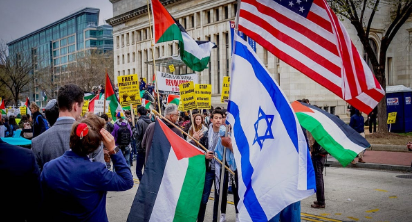
In recent weeks, the world watched in horror as a war between Israel and Palestine erupted. The conflict originated from decades of territorial disputes and conflicts ever since Israel gained independence. It has dire humanitarian consequences, and resulted in numerous human rights abuses from both parties involved.
This Israel-Palestine conflict has a long and complex history; Because of competing identities and land disputes, mostly over Jerusalem, five Arab states invaded Israel the day after it declared independence in May 1948, and tension continued to exist ever since, even during peacetime. The conflict was restarted on October 7, 2023, when the Palestinian militant organization Hamas launched a massive surprise attack on southern Israel. This attack prompted Israel to declare war on Palestine and continue to escalate the situation through their own military operations. “We will be victorious in this war despite an unbearable price,” Israeli Prime Minister Benjamin Netanyahu said on the platform formerly known as Twitter.
The conflict quickly spilled over into a broader regional concern across the Middle East; Egypt expressed fear of being drawn into the conflict by admitting aid and refugees through the border with Gaza. “Of course, we sympathize. But be careful, while we sympathize, we must always be using our minds in order to reach peace and safety in a manner that doesn’t cost us much,” Egyptian President Abdel Fattah el-Sisi said, according to CNN. According to Reuters, the Rafah border crossing between Egypt and Gaza was closed when the war started, having previously been the entry point of over one-third of Gaza’s commodity imports; the crossing was finally opened to extremely limited humanitarian aid on October 21. Additionally, Iran was implicated for providing support and resources to Hamas; White House national security spokesperson John Kirby said that “Iran has long supported Hamas” and that they were “complicit” in instigating the conflict, according to The Guardian. Even though Iran’s leader Ali Khamenei denied these allegations, the country’s alleged involvement still raises additional concerns about regional dynamics and the scale of this conflict.
Both sides bear some blame for the initiation of this latest incident of violence. The initial attack on Israel marked a significant escalation, making it a focal point for international condemnation. Their indiscriminate rocket attacks on Israeli civilian areas and taking of hostages are examples of grave violations of international law, according to PBS. Civilians are facing the psychological trauma of these frequent rocket attacks and the loss of loved ones. Hamas has taken hundreds of hostages from their homes to the Gaza Strip, and threatened to execute them should Israel continue unannounced strikes on civilians, according to Deutsche Welle. As of October 23, at least 222 people were taken by Hamas as hostages, and four have been released, according to NBC.
However, the other side’s response to the attack also drew criticism. According to Human Rights Watch, Israel’s approach to handling the conflict has caused extensive harm to millions of civilians and has violated international law, due to extensive air strikes, ground operations, and the declaration of a blockade of the Gaza Strip. The region’s health infrastructure was already in a dangerous state due to the impact of previous conflicts. Now, Israel has blocked critical resources, including food, water, electricity, and fuel. The siege, combined with Israel’s destruction of Palestinian infrastructure, has caused a crisis for healthcare in Gaza. The United Nations has warned that vital supplies are running out. Although Egypt had allowed 20 trucks of aid to enter Gaza, this small amount is insufficient to help all 2.3 million residents in the territory. Further, Israel’s illegal use of white phosphorus in military operations in the Gaza Strip has also raised concerns around human rights. Human Rights Watch claims that white phosphorus can indiscriminately cause excruciating burns to the civilian populations, and set fields, buildings, and other structures on fire, causing significant harm even outside the direct vicinity of people.
On October 16, Israel again escalated the tense situation by ordering over one million people, half of Gaza’s population, to evacuate within 24 hours ahead of an imminent ground invasion of the northern Gaza strip, according to Human Rights Watch. Though the initial 24-hour deadline passed, this virtually impossible command caused additional fears for the safety of Gaza’s civilian residents and the violent direction the conflict is headed.
In the morning of October 17, Israel killed Ayman Nofal, the Commander of Hamas’ Central Brigade in Gaza, in an air strike. He was the second and highest-profile Hamas leader killed in the war; Earlier in the week, on October 15, the Israel Defense Forces (IDF) announced that Bilal Al Kedra, along with other “Hamas and Jihad terror activists”, were also killed. “We won’t stop until we eliminate Hamas,” the IDF said in an announcement of Nofal’s death on the platform formerly known as Twitter.
As evident from the region’s history, conflict resolution cannot come from force, and instead should be attempted through peace. Various governments and organizations have initiated efforts to end the ongoing conflict; For example, President Joe Biden will soon visit Israel to address some issues in the region. Even with international backing, however, both sides of this war must be willing to engage in discussions aimed at addressing this conflict’s causes.
The Israel-Palestine conflict is a complicated and highly sensitive issue. While it is easy to immediately assign blame to Hamas for starting the war, one must still condemn the escalation of violence and human rights abuses from both sides. International diplomacy can offer hope of a solution to end the suffering of civilians and bring peace to the area in the long term. However, the region’s future remains completely uncertain and still involves numerous challenges that will require the world’s concerted efforts to overcome.












